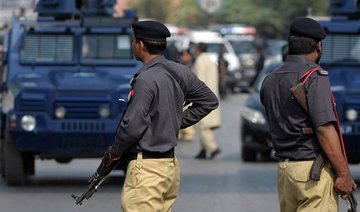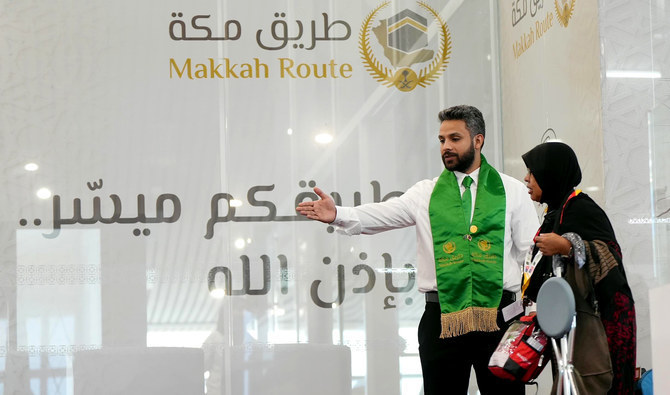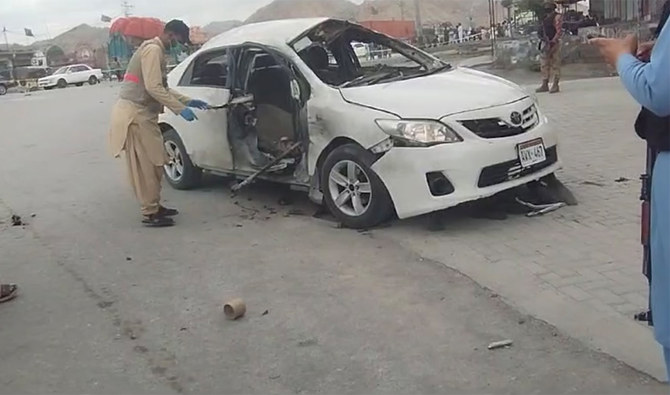LAHORE: A Pakistani police spokeswoman said on Monday an investigation team was recording statements of witnesses and working to identify security officials involved in the killing of four people, including a woman and a twelve-year-old child, in an encounter with a suspected militant that has sparked nationwide rage over extrajudicial killings and police impunity.
Officials from the counter-terrorism department (CTD) in Punjab initially described Saturday’s shootout as a successful operation against Daesh-linked militants, including two women, who opened fire when police tried to stop their car near the city of Sahiwal.
But the official story soon began to unravel when the couple’s three children who survived the shooting said the family had been traveling from Punjab’s capital city of Lahore to attend a wedding in the south of the province when they were stopped near Sahiwal by authorities who opened fire at their car.
Their mother Nabila, grocery store owner father Muhammad Khalil, 12-year-old sister Areeba and a family friend Zeeshan Javed were killed on the spot. The CTD said their target was Javed, a local Daesh leader involved in killings and abductions.
As the official narrative became further compromised by CCTV footage and eyewitness accounts that showed the deceased party had never opened fire, a joint investigation team headed by Punjab Additional Inspector General Ejaz Shah and comprising officials from three leading intelligence agencies was dispatched to Sahiwal on Monday. They spent the day recording statements of eyewitnesses and police officials and collecting evidence from the crime scene.
“A joint investigation team is investigating the crime scene in Sahiwal,” Punjab police spokeswoman Nabeela Ghazanfar told Arab News. “They are trying to identify the CTD officials and also recording statements of witnesses.”
“The JIT will submit its report by Tuesday evening after which the investigation will take its direction,” she added.
Staged encounters – a practice where police claim the victim was killed in a gunfight though they were summarily executed – are not uncommon in Pakistan. Abusers are rarely held to account.
Last year, a civil rights movement grew out of the police killing of a 27-year-old man in the port city of Karachi who police said was a Taliban militant but who turned out to be a shopkeeper and aspiring model with no links to militants. Police in Punjab too are notorious for staged encounters.
A statement issued by the CTD said suspected militants in Punjab routinely travelled with families to avoid police checking.
The CTD’s version of events, as recorded in the police first information report, said officials from the department signalled for a white Suzuki car and a motorcycle to stop near the Sahiwal Toll Plaza: “First, the terrorists riding the motorcycle started firing at the CTD officials who retaliated with firing too. Once the firing stopped, four people were found dead in the car while three terrorists had fled the scene."
But a cellphone camera recording by a passerby showed that a car carrying seven people including children was intercepted by CTD officials on the main highway near Sahiwal who then sprayed the vehicle with bullets.
Local news media also contradicted CTD officials and reported, citing eyewitnesses, that the traveling family never opened fire on the police and no weapons were recovered from their vehicle.
“According to the CTD, the operation was carried out on the basis of string intelligence reports,” Punjab law minister Raja Basharat said in a press conference on Sunday. “Zeehsan [Javed] was associated with a Daesh network which had killed police officials in [the city of] Faisalabad and ISI [Inter-Services Intelligence] officials in [the city of] Multan. The car he was using to carry Khalil’s family remained under the use of the terrorists,” he added, saying authorities had CCTV footage to back their claims that Javed was involved with Daesh.
Police have yet to release this footage.
On Monday, the deceased family members and Javed were laid to rest at a local graveyard in the Kahna area of Lahore amid shrieking, sobbing and prayers by relatives and neighbours who demanded strict action against the CTD.
According to Muhammad Jalil, the brother of the deceased Khalil, CTD officials took off with the four bodies after the shootout and left the three surviving children, including two who were injured, at a gas station from where they were recovered by local police.
“The family was going to attend a wedding ceremony when the CTD attacked them,” Jalil told Arab News. “We still want to know: what was their crime?”
Jalil was also on his way to the wedding and was following Khalil’s car in his own vehicle. In a report registered with police, he said: “My brother Khalil and other family members were going to attend the wedding of a cousin when 16 CTD official (10 uniformed and 6 in plain clothes) forced Khalil’s car to stop near Qadirabad and fired indiscriminately, as the result of which my brother Khalil, his wife Nabeela, friend Zeehsan, daughter Areeba died, while son Muhammad Omair, 9, daughter Hadia, 8, received bullet injuries and Muniba, 4, remained safe.”
Police were initially reluctant to register a case against the CTD officials on Jalil’s complaint but protests by locals in Sahiwal and Lahore, who closed down major city roads, compelled authorities to register a case.
Chief Minister Usman Buzdar also visited the injured children in hospital and offered Rs20 million ($144,000) as compensation.
But family members have rejected the offers of money.
“The government has offered us compensation but we offer them double of what they have offered us to get us justice,” Khalil’s nephew Qasim Butt told Arab News after the funeral. “We are ready to sell all our property for this purpose.”
“I don’t know what I will tell the young cousins who were deprived of their parents; where their parents have gone and why?” he said. “Little Hadia keeps repeating that police killed her mama and baba [father]. Omair, who received a bullet in his thigh, also keeps crying.”
The prime minister too demanded answers, saying in a tweet that “exemplary punishment” would be accorded to the guilty and that he would personally review and reform the structure of Punjab police.
“The episode tells us about police culture, training and mindset,” former Punjab chief minister and professor Hasan Askar Rizvi told Arab News. “Shooting at somebody is the last option for policemen but in this case, they opted for it as the first one.”
He said even if all the people in the car were militants, “they were empty-handed and could have been arrested alive.”
“Catching a terrorist alive is always preferred by professional security officials as live terrorists can help police break an entire network,” Rizvi said. “Police here need reforms and training. This culture of extrajudicial killings must end.”


















